Some of the secret joys of living are not found by rushing from point A to point B, but by inventing some imaginary letters along the way.
Douglas Pagels
When I look back on all these worries, I remember the story of the old man who said on his deathbed that he had had a lot of trouble in his life, most of which had never happened.
Winston Churchill
Stressed Out
You are exhausted. When you get home, you drop your work bag and realize you forgot to send an e-mail to your supervisor about an upcoming project. You groan as you run downstairs to your computer. The clock says 7:03 p.m. and you feel like you haven’t had a minute to yourself since this morning. As you think about your day, you realize, you haven’t! It is your company’s busy time so the last few days have been booked with meetings and a huge project, with a Friday deadline. You send the e-mail, make a quick sandwich for dinner, and sit back down at your computer. You are hoping to get a few more things done on the project before tomorrow morning. As you work, you receive text messages from a colleague who is working on one portion of the project. You answer her texts and think about checking Facebook but decide against it as you just have too much to do. Your status update meeting is at 9 a.m. and you want to be able to show extensive progress on the project. At 10:30 p.m., you shut your computer, go to bed, and have a hard time falling asleep because you are thinking about everything you need to finish this week.
Does this sound like someone you know? Many people today are struggling with the ability to manage time with so much work to do and personal/family lives to manage. Technology has certainly made working longer hours easier, as we are always in touch with the office. What we can tend to forget is the importance of managing our stress levels so we can function more effectively. In this situation, having no free time during the day may work for a few days but isn’t a healthy long-term solution. This chapter will discuss some types of stress, the effects of stress, and what you can do to reduce stress.
Stress can be challenging to explain, because it means different things to different people. For example, going swimming might be stressful to some, but for others, it might be enjoyable. Stress affects our ability to relate to others because too much stress cause us to be irritable, which affects our communication skills. We will discuss more later on the effects of stress and human relations.
Hans SelyeThe American Institute of Stress, “Stress, Definition of Stress,” accessed February 15, 2012, http://www.stress.org/daily-life/ defined stressThe nonspecific response of the body to a demand for a change. as the nonspecific response of the body to a demand for a change. In 1936, Selye researched this topic and discovered something surprising. When subjecting lab animals to acute but noxious physical and emotional stimuli—such as blaring light, loud noises, extreme heat or cold, or frustration—they all experienced the same physical symptoms of stress, such as the enlargement of the adrenal glands. He saw that these intense stresses over long periods of time caused other issues such as heart attacks, strokes, and kidney disease. His conclusion was that stress actually caused these conditions,The American Institute of Stress, “Stress, Definition of Stress,” accessed February 15, 2012, http://www.stress.org/daily-life/ not the stimuli themselves. Today, we usually define stress as the body’s way of responding to a demand. For example, if you are stuck in traffic and are going to be late for school, this may create stress. Having two tests in one day may cause stress as you try to find time to study for both. Likewise, you can feel stress in a difficult personal relationship with a family member or a significant other. Other definitions of stress include the internal reaction to a situation that could disturb a person’s well-being.
There are four types of stress. The first type of stress is called acute stressThe most common form of stress and normally comes from demands and pressures of the past and future demands.. This is the most common form of stress and normally comes from demands and pressures of the past and future.American Psychological Association, “Stress: The Different Kinds,” accessed February 15, 2012, http://www.apa.org/helpcenter/stress-kinds.aspx This kind of stress tends to be short term. For example, suppose you have a busy day. You have to drop your niece and nephew at school, stop by the post office, go to class, take a quiz, get an oil change, pick your niece and nephew up from school, drive home through traffic, and make dinner. A busy day such as this can create stress, but it is short term, because perhaps tomorrow you are less busy or are looking forward to the weekend where you don’t have as much to do. Every person experiences this kind of stress. Acute stress is a laundry list of the things we must do or a list of the things that didn’t go right. For example, if your car breaks down on the way to the post office, this creates a certain amount of acute stress, but once the car is fixed there is no stress associated with it.
Episodic acute stressCan be a more serious form of acute stress; the person feels stress on a daily basis and rarely gets relief. is a more serious form of acute stress. In this type of stress, the person feels stress on a daily basis and rarely gets relief.American Psychological Association, “Stress: The Different Kinds,” accessed February 15, 2012, http://www.apa.org/helpcenter/stress-kinds.aspx Unlike acute stress, where there may be one or two busy, stressful days, episodic acute stress happens on a daily basis. The person who suffers from episodic acute stress feels stressed constantly with little relief. You have probably met these people. They may constantly complain about how much work they have and may be constantly late or always in a rush and may be anxious and irritable on a regular basis. Often, a person who suffers from this type of stress may have taken on too much and created self-imposed demands.
Chronic stressThis is long-term stress where people see little way out of a situation. is the type of stress that happens month after month, year after year. This is long-term stress where people see little way out of a situation.American Psychological Association, “Stress Won’t Go Away?” accessed February 15, 2012, http://www.apa.org/helpcenter/chronic-stress.aspx Sometimes, chronic stress begins with traumatic experiences such as Post Traumatic Stress Disorder (PTSD) or childhood experiences. In others, chronic stress can occur in response to everyday stressors that are ignored or not managed well.American Psychological Association, “Understanding Chronic Stress,” accessed February 15, 2012, http://www.apa.org/helpcenter/understanding-chronic-stress.aspx For example, someone may have episodic acute stress, but over a long period of time, this can become chronic stress. With this type of stress, the person has given up looking for solutions to the stress and tends to just live with it. For example, consider a couple who is very unhappy in their relationship. While at one point in time in their relationship they may have experienced acute stress when arguing, this could have turned into episodic acute stress as the arguing occurred more frequently. Then when that type of stress was unrelieved for a long time, it became chronic stress. It becomes chronic because the couple took no steps to repair their relationship.
We tend to think of all stress as negative, but as Seyle pointed out in his early research, some types of stress can actually cause us to challenge ourselves and work at a higher level.Laura Schenck, “Eustress vs Distress,” June 26, 2011, accessed February 15, 2012, http://www.mindfulnessmuse.com/stress-reduction/eustress-vs-distress For example, if you want to run a marathon, at some point you may have to physically challenge yourself to keep running even when you are exhausted. This type of stress—positive stress to help us achieve at a higher level—is called eustressPositive stress to help us achieve at a higher level and challenge us.. It can motivate us to reach goals. For example, we may experience eustress before a job interview. This eustress can be positive if it helps us achieve success in the interview. Some people may view positive stress as negative stress and vice versa. For example, if I were told I needed to run a marathon, this would most definitely create negative stress for me. However, for others, this might be an enjoyable experience that generates eustress.
The Human Function Curve, originally developed by Peter Nixon, says there are different levels of stress that we may experience and our stress level affects our level of performance. He calls any state where we are awake and reacting to stimuli an arousal state, such as being at work. If we compare the amount of stress to our performance, our performance actually improves when we experience eustress. However, according to this model, there is a point where chronic stress can impede our performance. Looking at Figure 3.1 "The Human Function Curve", you can see in the drone zone, for example, that our performance is low. We may be bored and not have enough positive stress for us to perform at a higher level. In the C zone, for example, we may experience eustress, which raises our performance. However, when we reach the fatigue zone, we could be experiencing chronic stress, which impedes our performance.
Figure 3.1 The Human Function Curve
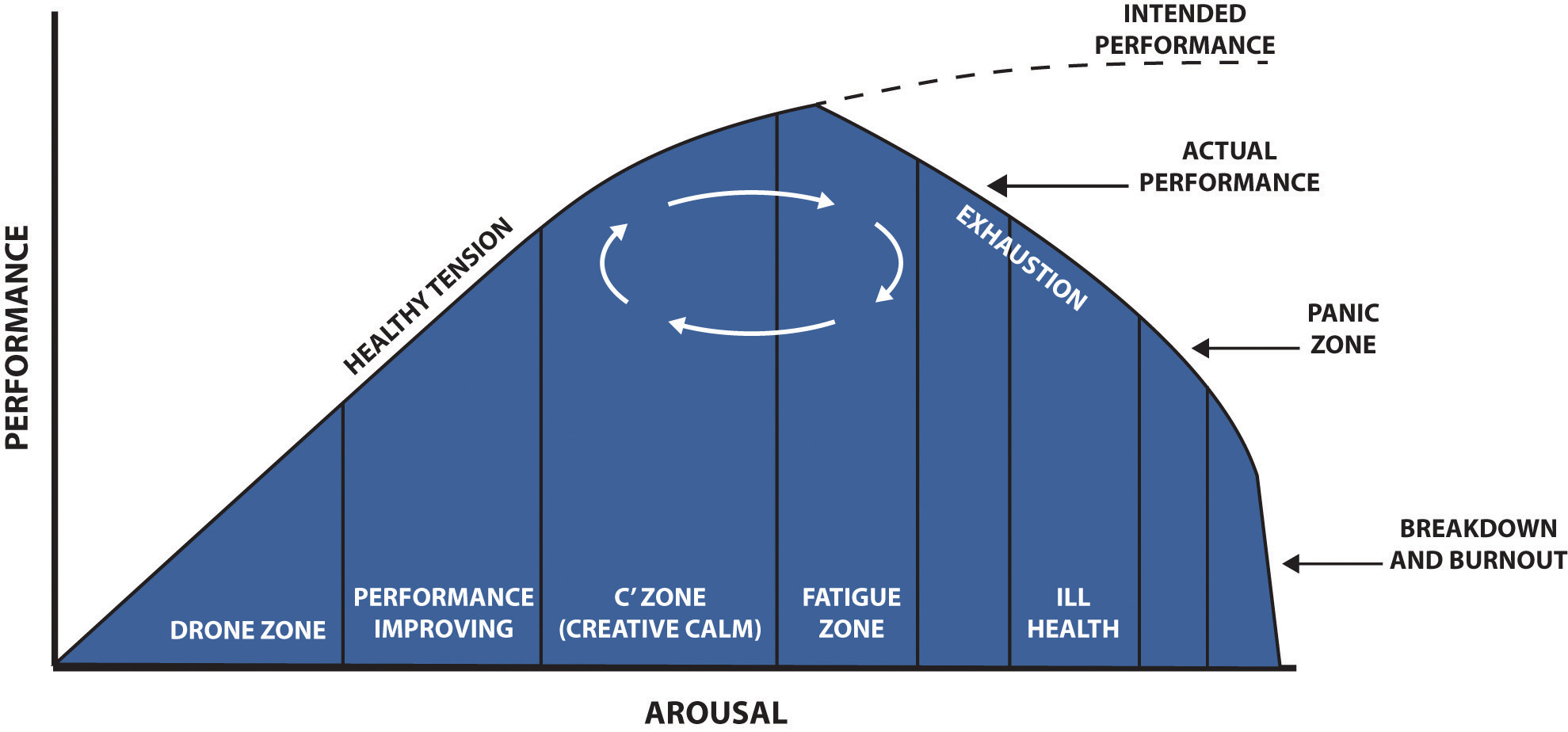
As you can see, performance is actually improved with a certain amount of stress, but once that stress becomes episodic or chronic, our performance actually goes down.
Another important thing to remember about stress is that it varies from one person to another. One person may feel intense acute stress when asked to give a speech in front of the class, while someone may feel eustress if asked to give the same speech. Likewise, it may take one person much longer—and more stress than another—to reach the C zone of performance. When dealing with stress, finding the ideal stress level—the one that creates eustress and gets you ready for challenges—is the goal.Hans Selye, “The Nature of Stress,” The International Institute of Stress, accessed February 15, 2012, http://www.icnr.com/articles/the-nature-of-stress.html
Take the quiz listed at http://www.arc.sbc.edu/stressquiz.html and then answer the following questions:
Discuss which types of stress these situations might be:
Our bodies go through a number of changes when we are faced with a stressor. From prehistoric times, physical changes in our body had to occur in order to prepare us to handle the stress. For example, we needed to be able to run fast to get away from something that could hurt us or we needed the energy to obtain food. This is called the fight or flight responsePhysiological reactions in the body that enable us to mobilize to deal with a stressful situation.. This concept was developed by Walter Cannon in the 1920s, and he believed that these reactions in the body enabled us to mobilize to deal with a stressful situation.Brian Luke Seaward, Managing Stress: Principles and Strategies (Jones and Bartlett Publishing), 6. More recent research has shown the addition of “freeze” to the response. This occurs when the fight or flight response didn’t work—or we were unable to react quickly enough to fight or flight, and we “play dead” or become immobilized. This response is as natural as fight or flight in our body chemistry. Consider the person attacked by a bear who plays dead and survives. The person couldn’t run (flight) and couldn’t effectively fight against the bear, so the freeze reaction (or the “do nothing,” play dead) reaction can sometimes work. We use the freeze reaction in response to stress triggers at work. For example, we can’t just leave (flight), as we typically need the job to pay our bills; it also may not be worth it to fight, so we freeze in response to the situation. Although this is an oversimplification of the body’s chemistry, it illustrates the point that the flight-fight-freeze response is actually a very prehistoric event. Today, even though our stresses may be different, our body still reacts the same way as it did in prehistoric times. To fully understand how stress impacts us, we need to understand how our bodies handles stress. When our brains initially perceive a threat, a few physiological effects, Figure 3.2 "Physiological Effects of Stress", occur within each system of our bodies.
Figure 3.2 Physiological Effects of Stress
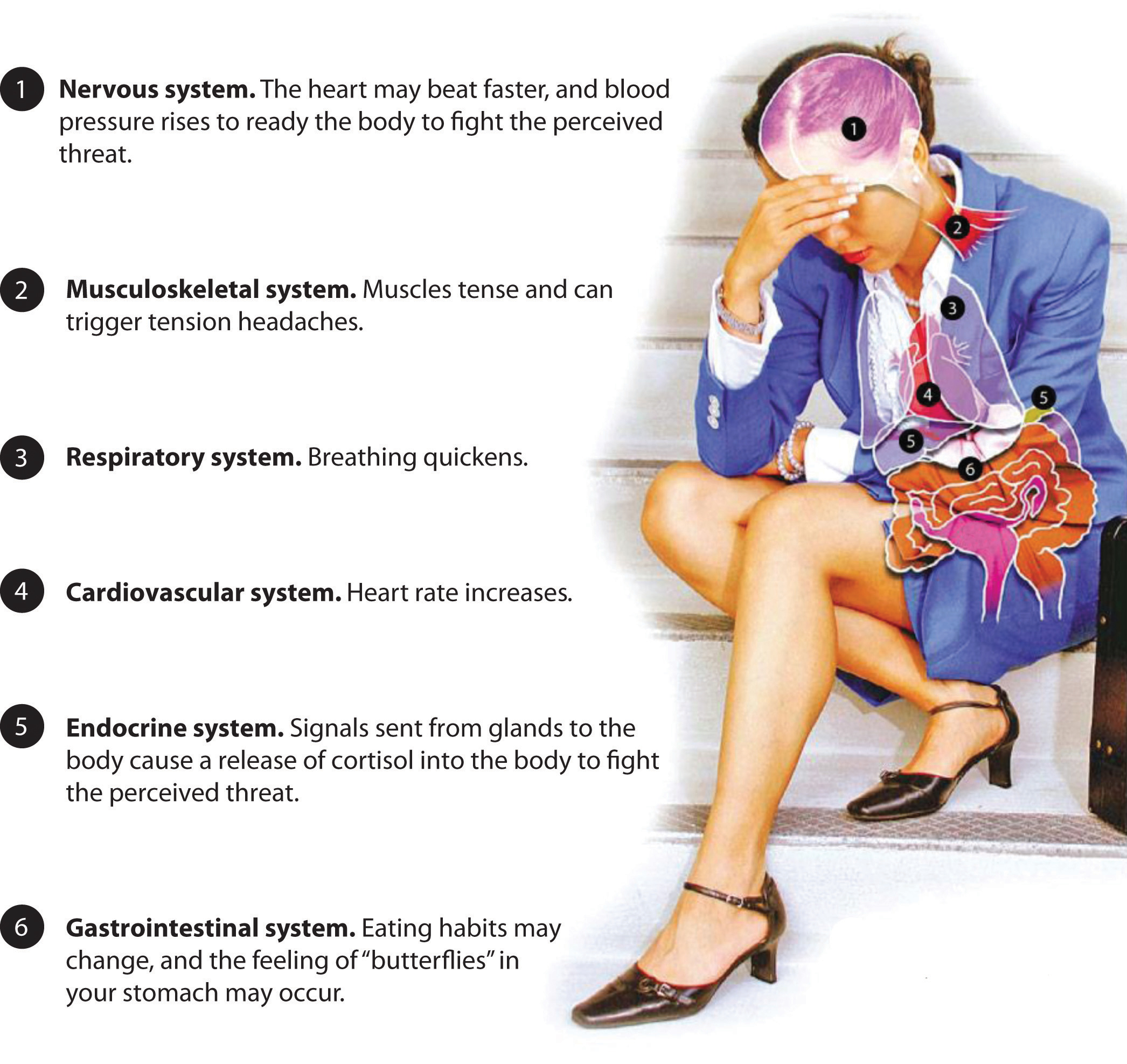
Physically our bodies go through various changes to prepare us for a flight or fight response.
Courtesy of The American Institute of Stress, www.stress.org.
According to a survey of the American Psychological Association, 44 percent of Americans lie awake at night because of stress.American Psychological Association, “Stress in America: Our Health at Risk,” 2011, accessed February 16, 2012, http://www.apa.org/news/press/releases/stress/2011/impact.aspx This is one example of how prolonged episodic stress can affect our personal life and our productivity at work. It is a positive thing for our body to get ready for acute stress. It prepares our body to perform at a higher level. However, long-term chronic stress or episodic acute stress can cause a variety of problems. Those problems are listed in Table 3.1 "Common Effects of Stress on Our Bodies, Moods, and Behaviors".
Table 3.1 Common Effects of Stress on Our Bodies, Moods, and Behaviors
| On Your Body | On Your Mood | On Your Behavior |
|---|---|---|
| Headache | Anxiety | Overeating or undereating |
| Muscle tension or pain | Restlessness | Angry outbursts |
| Chest pain | Lack of motivation or focus | Drug or alcohol abuse |
| Fatigue | Irritability or anger | Tobacco use |
| Disinterest in things we normally enjoy | Sadness or depression | Social withdrawal |
| Stomach upset | ||
| Sleep problems |
Source: Mayo Clinic Staff, “Stress Symptoms, Effects on Body, Feelings and Behavior,” February 19, 2011, accessed February 16, 2012, http://www.mayoclinic.com/health/stress-symptoms/SR00008_D
In the 2011 American Psychological Association Stress survey,American Psychological Association, “Stress in America: Our Health at Risk,” 2011, accessed February 16, 2012, http://www.apa.org/news/press/releases/stress/2011/impact.aspx 42 percent of Americans report anger as a result of stress, while 37 percent report fatigue as a result of stress. Lack of interest, motivation, and energy is reported by 35 percent of Americans. Digestion issues and changes in appetite are also reported. With these being fairly common occurrences, we can see the importance of learning how to manage stress. These symptoms can affect our ability to communicate well and be productive at work. If we do not get enough sleep, we lose interest and motivation and we are not our best at work, which can result in poor human relations with our coworkers, friends, and family. In Section 3.3 "Sources of Stress", we will look at some possible causes of stress and discuss some of the ways we can learn to better handle stress.
Stress can shut down our ability to think rationally and feel emotions. As you know from Chapter 2 "Achieve Personal Success", these two abilities are part of emotional intelligence (self-management and self-awareness). These abilities allow us to identify and then manage our emotions. When we identify our stressor and our emotion around that stressor, we can begin to make plans on how to handle it. Without the ability to identify this emotion, we are not as well equipped to handle the emotions that may come with stress. Without these stress-management skills, we can let our stress get out of control. When stress occurs, the shutting down of our emotions doesn’t allow us to make rational decisions, nor does it allow us to be emotionally available to others. Because of this, stress can affect our ability to communicate and work effectively with people at work. People who are stressed often are impatient, poor listeners, and may lose their sense of humor. These temporary behaviors that occur when we are stressed can impact how others see us, and how well we interact with them. Also consider the effect stress may have on our ability to manage conflict.Stresshacker, “Stress and Emotional Intelligence,” 2012, accessed May 31, 2012, http://www.stresshacker.com/2010/09/eclass-5-stress-and-emotional-intelligence/ If someone is stressed about day-to-day frustrations, such as traffic, bills, workload, and to-do lists, the stress does not allow him or her to manage conflict, as emotions are in a state of confusion. This can lead to poor decision making and thus result in the inability to interact effectively with others. Everyone has stress in both their personal and professional lives. Learning how to manage this stress is one of the first steps in making sure we are mentally prepared to nurture our relationships at work and at home.
This video illustrates how our flight or fight response is similar to that of prehistoric times.
As we have studied so far in this chapter, we can experience a number of possible stressors. We can divide these stressors into personal stresses and work stresses. Although we divide them for purposes of ease, it is intuitive that if someone is experiencing personal stress, he or she will also experience it at work, which will result in lessened workplace performance. In fact, the American Institute of Stress estimates that workplace stress costs companies $300 billion annually. This cost is a result of increased absenteeism, employee turnover, and higher medical and insurance costs due to stress related illness and worker productivity.The American Institute of Stress, “Stress in the Workplace,” accessed February 19, 2012, http://www.stress.org/workplace-stress/
According to the American Institute of Stress,The American Institute of Stress, “Stress in the Workplace,” accessed February 19, 2012, http://www.stress.org/workplace-stress/ some of the common causes of workplace stress include the following:
Figure 3.3 Some of the Reasons Cited for Workplace Stress
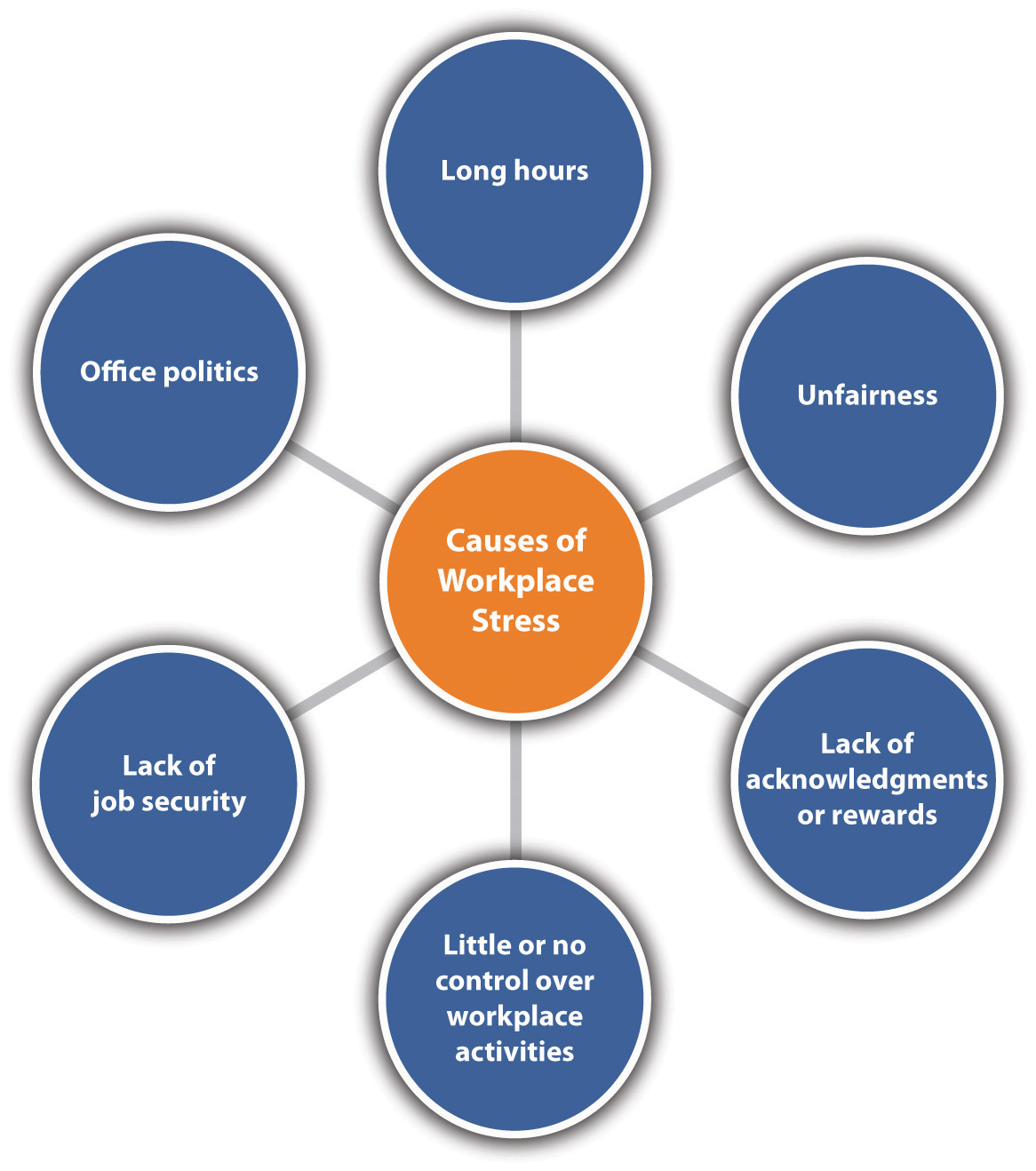
Registered clinical psychologist Dr. Cheryl talks about some ways to manage stress at work.
Figure 3.4 Time Use on an Average Work Day for Employed Persons Ages Twenty-five to Fifty-four with Children
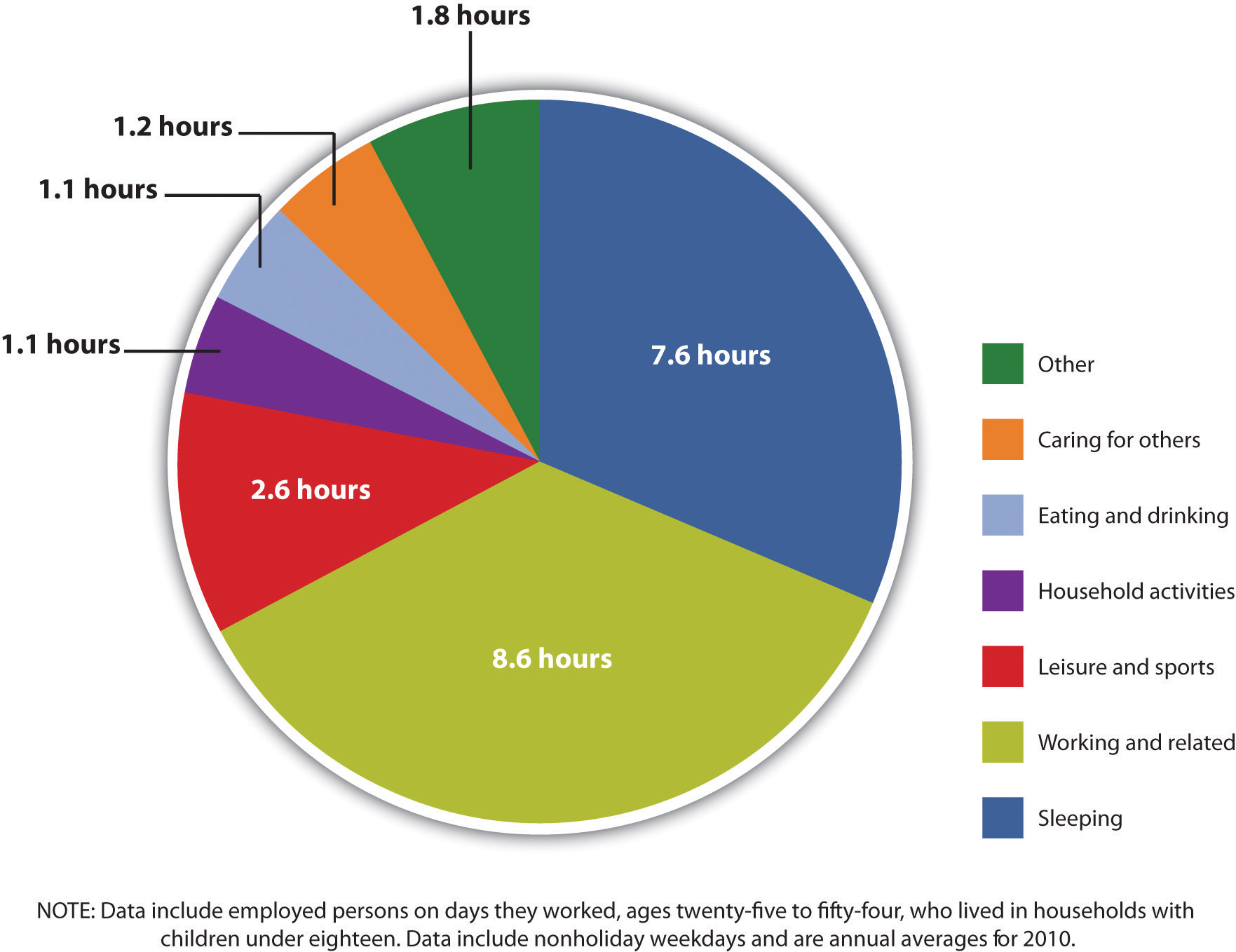
Data from the Bureau of Labor Statistics shows how much time we spend at work. Since we spend more time at work than doing anything else, learning how to manage stress at work is an important part to our personal well-being and productivity.
While job stress is important to consider, stresses in our personal life can cause issues in our job. In this section, we will discuss some of the major personal stressors.
A humorous (and exaggerated) example of stress caused by type A personality.
Figure 3.5
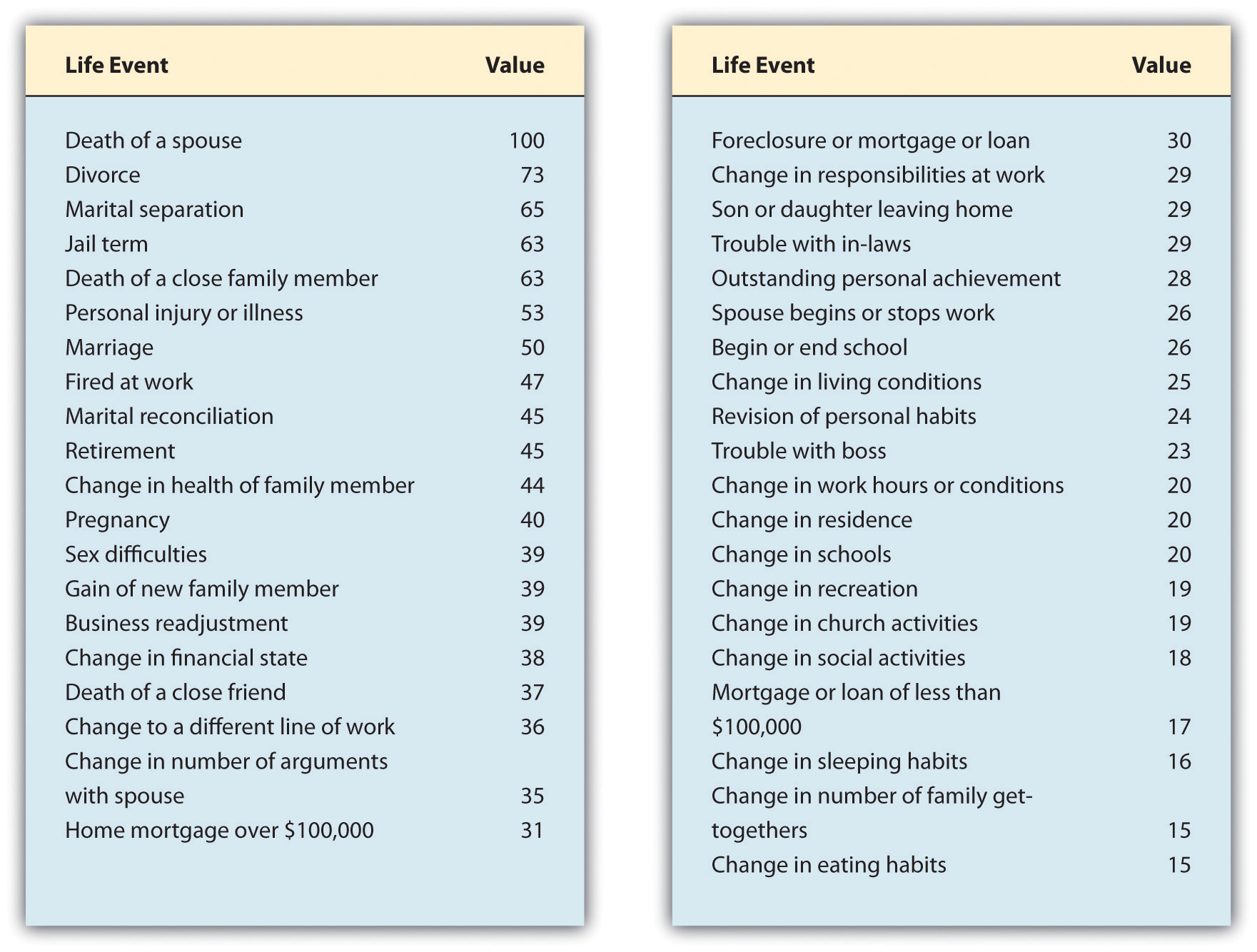
Thomas H. Holmes and Richard Rahe measured personal stress by Life Change Units. According to their research, the more “major changes” one experiences, the higher chance a person will end up with a stress-induced illness. Someone with a score of 300 or more is said to be at a high risk of illness.H. Thomas Holmes and Richard H. Rahe, “The Social Readjustment Rating Scale”, Journal of Psychosomatic Research 11, no. 2, (August 1967): 213–18. If you look at the events of your life over the last year, what is your score?
Now that we have discussed the things that cause stress, Section 3.4 "Reducing Stress" will address some ways we can relieve stress in our lives.
Understanding your own stress level is an emotional intelligence skill (self-awareness). Take this quiz, and rate how you typically react in each of the situations listed below.
4 = Always
3 = Frequently
2 = Sometimes
1 = Never
Enter the appropriate number in the blank for each question below, and then add up your numbers to determine your stress level.
Total: _____
If your score is between 20 and 30, chances are you are nonproductive or your life lacks stimulation.
A score between 31 and 50 designates a good balance in your ability to handle and control stress.
If you tallied up a score ranging between 51 and 60, your stress level is marginal and you are bordering on being excessively tense.
If your total number of points exceeds 60, you may be a candidate for heart disease and need to immediately find ways to relieve your stress.
We all experience stress at one time or another. However, we can take action to assess and relieve the stress in our life. First, we do some self-analysis to determine the stressors in our life and how we handle it. This emotional intelligence skill (self-awareness) allows us to see what we need to improve upon. Then, we can apply self-management tools to help us manage the stress in our lives. The benefit of this identification and management is that it allows us to relate better to others both in our work life and personal life.
Look at your habits and emotions and really think about what is causing the stress. For example, Julie may be stressed about a project due on Friday, but the real stress may be because she procrastinated in starting the project, and now there isn’t enough time to complete it. Or perhaps Gene is stressed because his personality type causes him to put too many things on his to-do list, and he isn’t able to get them done. Accepting responsibility for the role we play in our own stresses can be the first step in maintaining a life with mostly positive stress!
Next, we can look at the way we currently deal with stress. For example, when Emily is feeling stressed, she smokes a pack of cigarettes and tends to have several glasses of wine at night. When she isn’t stressed, she doesn’t smoke and may limit herself to just one or two glasses of wine every few days. Some people smoke marijuana or use other drugs to cope with the stress of everyday life. These substances seemingly help for a period of time but prevent us from actually dealing with the stress—and doesn’t help us to gain skills in self-awareness. Understanding your current coping mechanisms for stress can help you determine what works to manage stress—and what doesn’t.
Figure 3.6 The Four As for Dealing with Stress
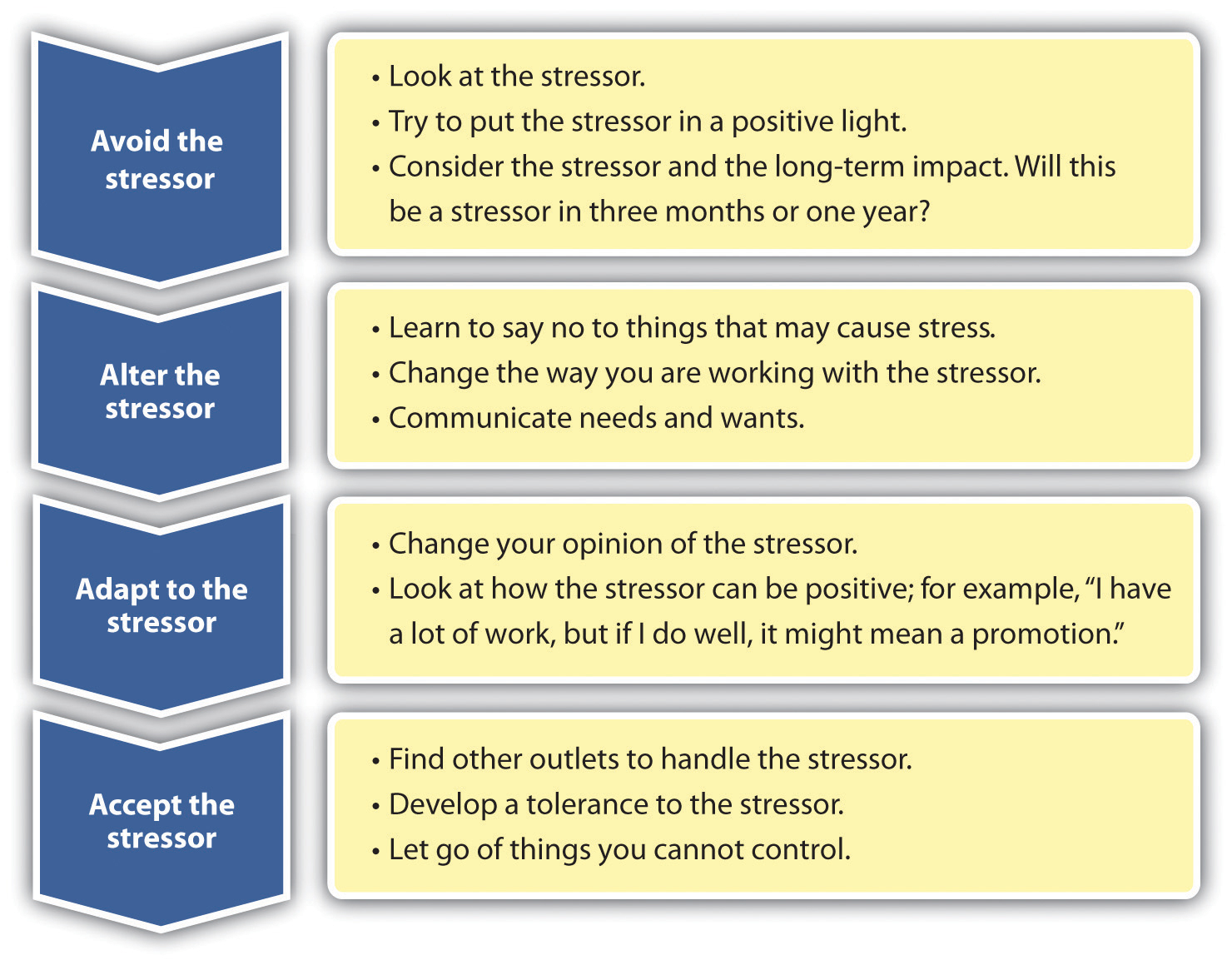
Once we do some self-analysis, we can use a method called the four As. The four As gives us four choices for dealing with a stressor:
When your roommate borrowed your car without asking, you need to pick up a friend from the airport, and you have friends coming over for dinner—all on the same night, finding a way to reduce stress is important. Reducing stress for every person is going to be different. Being able to recognize what helps you personally reduce stress is an important part to a healthy work and home life. For example, exercising may be a great stress reducer for Duana, but for Lisa, finding time to exercise might cause more stress than the actual exercise helps!
Researchers have found the following activities cut stress significantly:Elizabeth Sboboda, “Feeling Frazzled? 8 Ways to Decrease Stress,” MSNBC, February 15, 2009, accessed February 22, 2012, http://www.msnbc.msn.com/id/28719686/ns/health-behavior/t/feeling-frazzled-ways-decrease-stress/
Other ways to reduce stress might include the following:Jenny Kovacs Stamos, “Blissing Out,” WebMD, accessed February 22, 2012, http://www.webmd.com/balance/stress-management/features/blissing-out-10-relaxation-techniques-reduce-stress-spot
As this chapter has addressed, stress can be a positive motivator in our lives, but too much stress can create human relations issues, productivity, and other serious health issues. By practicing self-awareness and then self-management, we can begin to realize those things that cause us stress and deal with them in a healthier manner.
Mandy feels like she can’t deal with the stress anymore. First, her mother moved into her house for two months because of major home renovations. Mandy feels like her mother is constantly critical of the way she keeps her house and handles her life. While Mandy knows helping her mom for the next couple of months is the right thing to do, she can’t help being annoyed. Mandy is also having trouble at her job. Her job in the medical lab is usually fun, but the organization laid off three workers recently and Mandy finds her workload has been too much to handle. It is the hospital’s busy time, too, so Mandy often works late to get the work done. On top of all that, Mandy had lent her best friend, Sylvia, $200 last month for rent, and Sylvia hasn’t paid it back. Mandy not only needs the money but also feels that Sylvia was disrespectful when Mandy asked for the money back. Mandy is afraid this will affect their ten-year friendship.